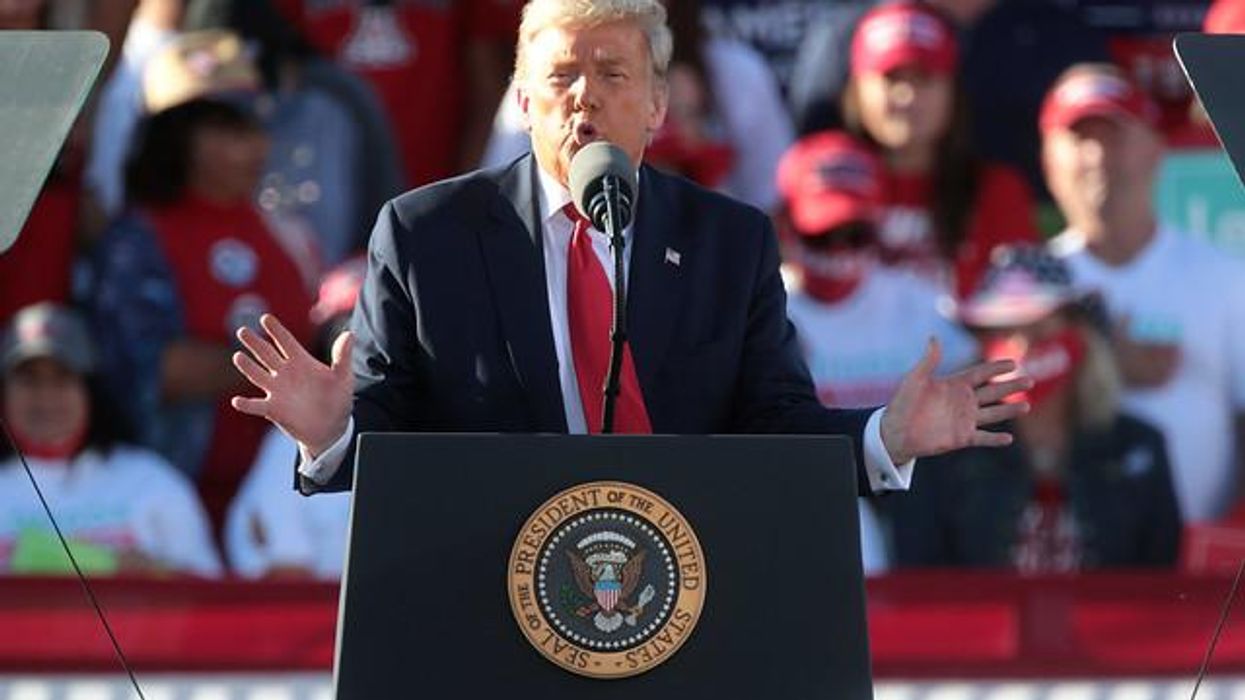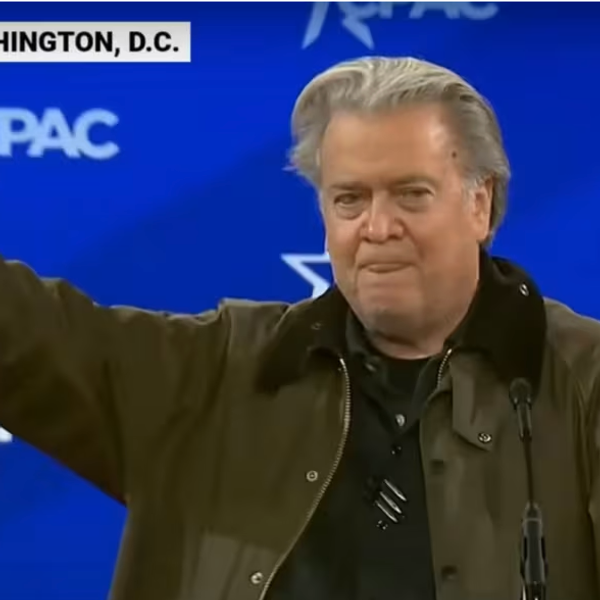Trump Faces The Trial Of The Century -- And So Does Our Democracy
The frame of the 2024 election is now clear: It’s democracy versus autocracy — straight up. It’s the stakes — not the horse race — that should dominate the media coverage and the approach of the Democratic Party.
Unfortunately, there’s a move afoot among some Democrats to re-use the successful 2018 playbook that helped them retake the House that year: Stay focused on other issues (in 2018 it was health care) and let the anti-Trump forces mobilize on their own. This is fighting not the last war but the war of three cycles ago. In the last war — 2022 — democracy was a potent, brand-building issue for Democrats.
So while I get why Joe Biden isn’t commenting on the Trump prosecutions, no other Democrat should follow suit. They should be raising the alarm and shivving Trump (metaphorically) for the duration.
Yes, it makes sense to run an A,B,C,D campaign — abortion, Bidenomics, climate, and democracy. But the last of these should often come first. That way, the basic structure of the race — democrats versus autocrats — stays firmly in place.
By the way, if you don’t believe that a reelected Trump will, quite literally, end our system as we know it, you have not been paying attention.
“We will demolish the deep state,” Trump said at the rally in Michigan. “We will expel the warmongers from our government. We will drive out the globalists. We will cast out the communists, Marxists and fascists. And we will throw off the sick political class that hates our country.”
If this was just more Trump demagoguery, the kind we became inured to in the eight years since he came down the escalator, we wouldn’t have to worry so much. But it’s not. It’s the campaign trail version of a plot to end our nearly 250-year-old experiment in self-government.
If you missed this lead story from The New York Times on July 17, please take the time to read it: Trump and Allies Forge Plans to Increase Presidential Power in 2025 (no subscription required). It will scare the crap out of you. The piece chronicles the detailed plans underway to dramatically expand the president’s authority so that Trump can assume near-dictatorial powers.
One thing almost all aspiring dictators have in common is that they announce what they’ll do if they get power. The Fuhrer certainly did, as Trump knows well. His first wife, Ivana, now deceased, told her lawyer in the 1980s that Trump kept a collection of Hitler’s speeches, My New Order, beside his bed. In those early speeches, and in Mein Kampf, Hitler lays it all out in language very similar to Trump’s.
As bad as Trump’s language was when he was president, it was shocking in March when he told supporters in Waco, Texas, “I am your retribution.” That location was chosen for his announcement speech as part of his plot to slime and discredit the FBI (which did not cover itself in glory in its attack on the Branch Davidian compound there in 1993) so he can rebuild it into his personal police force and instrument of “retribution.” Or recall how in 2019 Trump declared:
“I have an Article 2 [the part of the Constitution that establishes the presidency], where I have the right to do whatever I want as president.”
And if someone tries to stop him? He will, he said, “terminate the Constitution.”
The Times story explains Trump’s plans to eliminate the independence of the Department of Justice. This wasn’t news. We all understand, of course, that if reelected he will immediately pardon January 6th insurrectionists and himself. But he also plans to fully politicize the Federal Reserve (wonderful for the economy!) and bring all independent regulatory agencies under his thumb. And he will sign an executive order on his first day that implements “Schedule F” — a politicizing of the civil service that will fill the government with incompetent Trump hacks hired for their loyalty, not competence.
What’s really scary is that this power grab will be attempted under any Republican president elected in the foreseeable future. The GOP now stands for autocracy. For years, conservative lawyers have pushed what they call a “unitary executive” theory of presidential power that claims the Constitution gives presidents power over the sprawling federal bureaucracy, which, if you include military personnel, includes about 4.3 million people. In a notorious dissent in Morrison v. Olson (1988), Justice Antonin Scalia wrote, “this does not mean some of the executive power, but all of the executive power.” Scalia’s view now has at least four votes on the Supreme Court.
“What we’re trying to do is identify the pockets of independence and seize them,” Russell T. Vought, the director of the Office of Management and Budget under Trump, told the Times. Vought, the founder of the Center for Renewing America, is drafting a blueprint for how to make the entire federal government bend to Trump’s will.
Let’s pause for a second on that word “seize.” That’s what dictators do. They seize power. As Ruth Ben-Ghiat, author of Strongmen, explained on MSNBC.com:
Those plans are consistent with a 21st century playbook for authoritarians: Tell the public how you will set up an authoritarian state well before you get into office. Frame your intended expansion of executive powers as a mere streamlining of government. Don’t forget to repeatedly praise dictators as “brilliant” and “top of the line” people so there’ll be no surprises when you act in a similar manner. [This is what Trump has consistently done with China’s Xi Jinping, Russia’s Vladimir Putin, Hungary’s Viktor Orban and several other authoritarian leaders], And whet your followers’ appetites for destruction of existing norms by advertising how you will purge [liberal critics].
Trump will be using this roadmap all the way to the election. The good news is that at least three large boulders now stand in the way. The several civil suits won’t slow Trump down; he doesn’t have to appear in court during the trials and the cases—even if they lead to significant monetary damages— mostly just make him more popular with his base. But next year he will face three daunting criminal trials. In all of them, the odds favor conviction.
On March 25, Trump is scheduled to go on trial in the Stormy Daniels case. He’s facing New York State charges that are less serious than in the two federal cases, but with his abominable sexual and financial behavior on full display — disqualifying for any other candidate — he’ll likely lose support from independent voters, even if he’s acquitted.
On May 20, the Mar-a-Lago classified documents trial is scheduled open in rural Florida under Trump-friendly Judge Aileen Cannon, who on July 21 resisted Trump’s pressure to delay the trial until after the election. Trump’s lawyers may yet convince Judge Cannon that the volume of documents and complexities of handling classified information require delaying the trial until after the election. But if they fail to do so, the evidence is so damning that the defendant will likely be in trouble even in the heart of Trump country. In federal trials, jurors almost always set aside their politics and decide on the evidence. It’s a good bet that at least a couple of them will tell reporters after the verdict that they voted twice for Trump but convicted him anyway. And Trump’s lavish praise of Judge Cannon will deal a blow to his “witch hunt” charge.
Finally, there’s the Big Show — the January 6th trial. Given the absence of classified documents and the speedy trial views of federal judges in Washington, D.C., it may take place before the Mar-a-Lago trial. Whatever the specifics of the upcoming indictment, this case goes to the heart of our system — the peaceful transfer of power and the rule of law. The Stormy Daniels case isn’t unprecedented; we had Monica Lewinsky and plenty of campaign finance prosecutions. Before Trump stole classified documents, former national security adviser Sandy Berger and former General David Petraeus did so. But no president in American history has ever tried to cling to power after he lost.
That’s why this will be the trial not just of the century but of any century — bigger even than the Trial of Socrates, when Athenian democracy didn’t hang in the balance in quite the same way.
It makes me queasy to mention Trump and Socrates in the same breath, so let me offer three other possible comparisons to the Orange Menace:
Lucius Sergius Catilina — better known as Catiline — was a first century B.C.E. scoundrel who had sex with vestal virgins and tried to stage a bloody coup against the Roman Republic. Benito Mussolini, whose smug strut on the platform anticipated Trump’s, was a fascist innovator with lots of support before World War II, not just in Italy but the United States. John Gotti became an anti-hero in his Brooklyn neighborhood, where he sponsored festivals and fireworks, before entering folklore. Americans love seeing the bad boy get away with it — at least for a while.
All three were eventually brought to justice. Even if Trump somehow escapes again, the pursuit of him will have been worth it on principle. We are, after all, a nation built on a principle— the rule of law— and, as Lincoln said at Gettysburg, on a proposition — equality and freedom. We’ll know in 15 months whether a nation so conceived and so dedicated can long endure.
Jonathan Alter is a bestselling author, Emmy-winning documentary filmmaker, and a contributing correspondent and political analyst for NBC News and MSNBC. His Substack newsletter is OLD GOATS: Ruminating with Friends.
Reprinted with permission from OLD GOATS.











